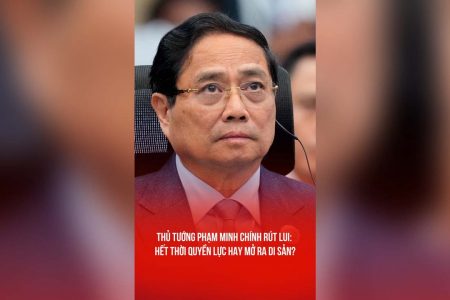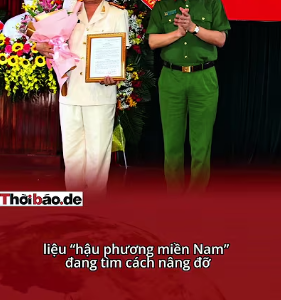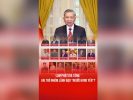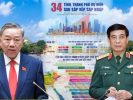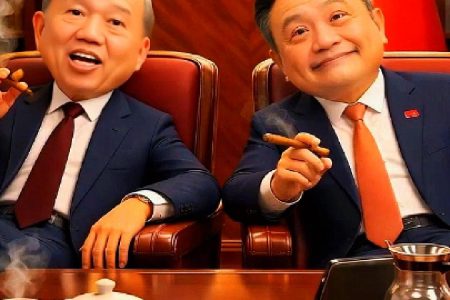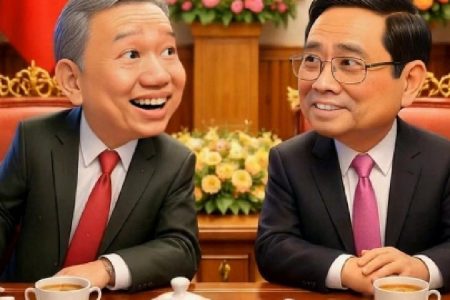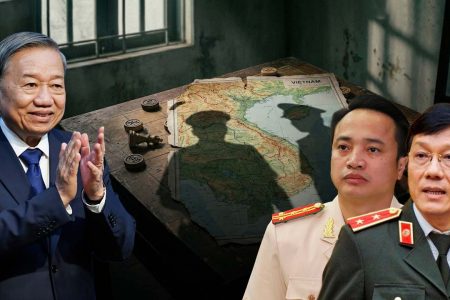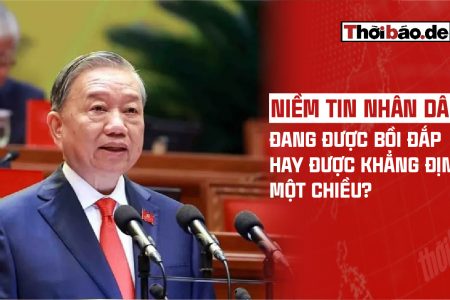
Vietnam cannot avoid the consequences of the Ukraine war. In addition to the immediate impact, such as the sharp increase in the price of gasoline and many essential commodities, and the turmoil in the stock market in the early days of Russia’s attack on Ukraine, Vietnam will have to find a way to deal with the long-term consequences of the crisis as the West and many countries around the world apply sanctions to Moscow and because the global supply chain is broken.
However, this is also an opportunity for Vietnam to promote exports, expand markets and trade partners.
Direct effects are not so much as indirect consequences
Vietnamese experts said that the crisis in Ukraine, as well as Russia’s sanctions by the West, „have a little direct impact on the overall Vietnamese economy“ because Vietnam’s two-way trade with Russia only accounts for a small amount of its total export-import turnover, about 1% and for Ukraine only about 0.1% of total exports. Responding to RFI in Vietnamese on March 17, 2022, Mr. Jean-Philippe Eglinger, a French observer, lecturer at Inalco School of Vietnamese economy and enterprises in Vietnam, further explained:
Bilateral trade turnover between Vietnam and Russia in 2021 was $5.5 billion, up 13.8% compared to 2020, of which exports were $3.2 billion, up 13.2% and imports reached $2.3 billion, up 14.9%. As for the Ukraine market, in 2021, trade turnover between the two countries hit $70.5 million, up 50.6% compared to 2020, of which exports from Vietnam was $334.6 million, up 21 %, imports from Ukraine reached $375.8 million, up 94.2%.
These figures are quite modest compared to Vietnam’s total import and export turnover of more than $650 billion. But since Russia has exited the Swift international payment system, if Vietnam is unable to find other payment methods without using US dollars, Vietnam will be directly affected by this conflict.
There are currently seven major Russian banks excluded from the Swift international payment system(1). Some other payment methods, such as in yuan through China’s CIPS system, are mentioned but are inconvenient, quite expensive, and time-consuming, as explained on March 1 by France Culture radio economist Sylvie Matelly, assistant director of the French Institute of International Relations and Strategy (IRIS):
“The Swift system is convenient for all common transactions, for example for businesses exporting to Russia or Russian businesses that want to exchange with the rest of the world. When people block this system, from large contracts or large enterprises to small and medium enterprises or commodity exporters… will face a lot of difficulties to circumvent this information system.“
The second effect is the price of many products skyrocketing due to broken production and distribution chains. Petroleum is the first commodity that can see the most obvious impact, not only in Vietnam but around the world. Although the increase in oil prices helps Vietnam to collect more than 57% from crude oil to the budget in the first two months of 2022, on the contrary, Vietnam also has to buy gasoline at a higher price because the domestic supply can only meet about 70- 80% of demand.
In addition, Russia and Ukraine are the world’s first and fourth largest wheat exporters. Russia is also a major supplier of many strategic goods, such as oil and gas, metals, fertilizers, coal, etc. These are also commodities that Vietnam imports mainly from Russia and Ukraine. Mr. Jean-Philippe Eglinger continued to explain:
“In terms of indirect effects, I think Vietnam will suffer trade deficit because Vietnam imports some raw materials and products from Russia, such as gas, gasoline, fertilizer, iron, steel, plastic, etc. . Moreover, many Vietnamese businesses and communities investing in Russia, Ukraine, and Eastern European countries may suffer certain losses, such as difficulties in foreign exchange payments, increased remittance fees, shortfall foreign exchange, downward pressure on the ruble, increasing inflation in Russia.”
Specifically, according to Vietnam News Agency on March 2, TH Group (specializing in clean dairy products) is among the large Vietnamese enterprises investing in Russia. Regarding oil and gas projects, there is RusVietPetro Joint Venture, one of PetroVietnam’s most successful overseas investment projects. Similarly, Vietnam will face difficulties in exporting to the Russian market many items (despite a very small share of Vietnam’s total trade turnover) such as mobile phones (accounting for $1,230 billion in 2021), textile products ($480 million), and electronic equipment ($640 million), according to statistics of the Business Forum page on March 3.
Russia also has many direct investment projects in Vietnam, mainly in the fields of oil and gas (accounting for about 85% of Vietnam’s total oil and gas production) and electricity. For example, the Long Phu 1 thermal power project, led by Russia’s Power Machines (PM) as the general contractor, was delayed by two years because PM company was on the US embargo list. Next is the offshore wind power project of Vinh Phong with the joint venture Zarubezhneft JSC Russia and DEME Concessions of Belgium, which signed a memorandum of understanding from April 2021. Sanctions will affect Russian investment projects in Vietnam, but to what extent? According to Mr. Jean-Philippe Eglinger, „in the current context, it is very difficult to analyze and forecast.“
“Since the Free Trade Agreement between Vietnam and the Eurasian Economic Union (EAEU, including the Russian Federation, the Republic of Belarus, the Republic of Kazakhstan, the Republic of Armenia and the Kyrgyz Republic) took effect on May 29, 2015, the growth of trade turnover between Vietnam and Russia averaged about 30% per year. In 2020-2021, bilateral trade is still growing more than 8% year-on-year in 2019, reaching $4.85 billion. Russia occupies the 25th position out of 140 countries and territories having direct investment capital in Vietnam with 150 projects. But with that said, right now, in a somewhat complicated situation, I’m not able to predict the future and about these projects.“
Diversify markets and trading partners
In recent times, analysts no longer simply talk about inflation risk when it comes to the impact of the Russian-Ukrainian conflict, but refer to the concept of „stagflation„, which is another way of inflation accompanied by a decline in GDP growth. The VnEconomy page on March 7 listed four solutions recommended by Vietnamese experts to respond to the Russia-Ukraine crisis: diversifying markets and supply sources, diversification of payment currencies, actively negotiating with partners on cargo transportation plans and business methods, and reviewing contracts and legal documents to ensure proactive in case of disputes.
Regarding the diversification of currencies and payment methods, „Vietnam and Russia have established a bilateral payment channel“ after Moscow was embargoed for invading the Crimean peninsula in 2014. However, according to Dr. Can Van Luc, a member of the National Financial and Monetary Policy Advisory Council, chief economist of BIDV, „This channel has not been active in the past time, but now it must be more drastic. Regarding the change of payment currency, the State Bank must also intervene soon to consider if necessary.
According to observer Jean-Philippe Eglinger, the issue of expanding markets and trading partners that Vietnam has actively carried out in recent years also helps limit the impact of the Russia-Ukraine conflict:
“Currently, the openness of the economy is usually measured by import and export turnover divided by the size of GDP. Currently, the openness of Vietnam’s economy is more than 200%, which is considered by economic experts to be a very large openness, proving that Vietnam has deeply integrated with the world economy.
Since a few years ago, Vietnam’s economy has developed strongly thanks to the growth of import and export turnover. Signing a free trade agreement with Vietnam is a strategic goal. By 2022, Vietnam has signed more than 15 Free Trade Agreements with more than 53 countries. This will contribute to helping Vietnam open up opportunities for export growth, balance the trade balance, attract investment, and participate more deeply in the global supply chain, as well as avoid being dependent on one country or certain export markets.
Moreover, diversifying foreign partners is important, but the development of the domestic market should not be forgotten with high-quality products equivalent to exported products.“
Vietnam is in a „difficult“ position between Russia and Ukraine
A week after Russia attacked Ukraine, on March 1, Vietnamese Ambassador to Russia Dang Minh Khoi received two vice presidents of the Council of the Russian Federation (Senate) to affirm the close bilateral relationship in the context of the situation in 2022 to celebrate the 10th anniversary of the Comprehensive Strategic Partnership and the 72nd anniversary of the establishment of diplomatic relations between the two countries. On March 3, at the United Nations General Assembly, Vietnam was among the 35 countries that abstained from voting on a resolution condemning Russia’s invasion of Ukraine and demanding that Moscow withdraw all its military forces. Despite being criticized, it must be said that this is a progressive step from the Vietnamese side: Not directly condemning Russia but implicitly opposing the war.
Professor of contemporary history Pierre Journoud, Paul-Valéry Montpellier University 3, explained to RFI Vietnamese about the close historical relationship between Vietnam and Russia:
“As relations between China and the Soviet Union deteriorated, so bad that the Soviet-Chinese divorce was talked about, a brief but bloody armed conflict in 1969 broke out over the Ussuri River, a tributary of the Soviet Union Amur river (Amyp in Russian, Heilongjiang after Chinese name). This event led to a series of decisions that redefine the stance. China has finally leaned in favor of the United States. Vietnam felt somewhat betrayed by China when they were bombed by President Nixon in 1972.
Hanoi developed an almost unique partnership with the Soviet Union and its satellite states at the time, including Communist Eastern Europe dependent on Moscow. Therefore, it is completely understandable the attachment of Vietnamese people to Russia when one knows this part of history because the Soviet Union at that time was a stable partner, supporting Vietnam, first of all in the war to win the war independence, followed by wars against America and against China.”
Still, according to Professor Pierre Journal, it is completely understandable that „it is important for Vietnam not to destroy this relationship in the current situation.“ In addition, Vietnam also has a good relationship with Ukraine stemming from the history of Communist bloc relations in Eastern Europe. This explains the fact that Vietnamese Foreign Minister Bui Thanh Son spoke by phone with his Russian counterpart Serguei Lavrov on the evening of March 15 and the next day with his Ukrainian counterpart Dmytro Kuleba „to discuss the conflict situation in Ukraine.“ Professor Pierre Journoud commented:
“I think the phone calls are diplomatic and mainly to ‚talk‘ to the public at home. I have a feeling that the Vietnamese people are divided on this topic. Of course, I don’t know it as well as Vietnamese, but I do watch, listen and read, and the interesting thing here is that even the articles contradict each other and further show that division. I don’t know what is the main trend, maybe the pro-Ukraine side because Vietnam has had to go through many foreign invasions, including France, the US, and China.
The example of China is also notable because it is the most recent conflict that Vietnam has faced. That military attack was also expected to be short, cause the most damage to Vietnam and eventually, become somewhat of a failure for China because they did not expect to face such resistance from the Vietnamese in 1979 and China suffered a lot. There are many articles comparing two conflicts, which are of course very different, the contexts are also very different, but from that point of view, meaning that a State is invaded by a larger country, there are the comparison factor is very interesting. And it is also possible that Ukraine’s supporters are the ones who put themselves in the position of being the victim of an attack like the one in 1979, but the example could also be in the South China Sea against Vietnam’s interests.
It can be seen that the Vietnamese government is in a very delicate position. We see that they are very awkward about this conflict, similar to Beijing but China has words, greater power, so it has more scope of action. Vietnam has close relations with both Russia and Ukraine, so it can only use the card of negotiation and dialogue… We wait and see if the war lasts long and may force Vietnam to take a clear stance. But for now, Vietnam holds a neutral stance, even acting as a mediator.
Vietnam has a lot of painful experiences about war, which we analyze in the work Un triangle à l’épreuve. La Chine, Les Etats-Unis et l’Asie du Sud-Est Depuis 1947 We can talk about peace and diplomacy because, in my opinion, those diplomatic and peaceful experiences will be the value of Vietnam.”
*****
(1) Seven Russian banks are listed in the list effective from 12 March, including VTB (Russia’s second-largest bank), Bank Otkritie, Novikombank (industrial investment), Promsvyazbank, Rossiya Bank, Sovcombank, and VEB (mode development bank). Three banks Promsvyazbank, Rossiya Bank, and VEB were on the list of Russian individuals and entities whose assets were frozen in the European Union in the first batch of 27 blockade sanctions a week earlier.
(2) Pierre Journoud (director), Un triangle à l’épreuve depuis 1947. La Chine, les Etats-Unis et l’Asie du Sud-Est (rough translation: A Strategic Triangle Through Trials. China, United States and Southeast Asia since 1947), Presses universitaires de la Méditerranée, 2022.
Translated by Thoibao.de from RFI: https://www.rfi.fr/vi/t%E1%BA%A1p-ch%C3%AD/t%E1%BA%A1p-ch%C3%AD-vi%E1%BB%87t-nam/20220321-viet-nam-giam-tac-dong-den-nen-kinh-te-do-xung-dot-nga-ukraina



